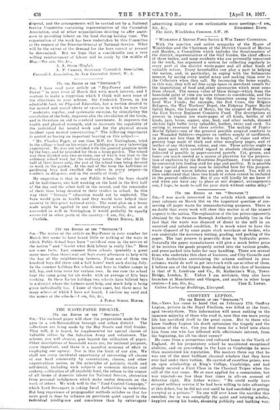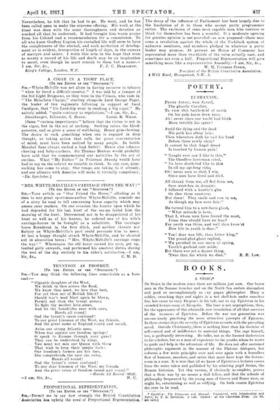GEOFFREY LUPTON.
[To THE EDITOR OF THE " SPECTATOR."] SIR,—.-News has come to hand that on February 17th Geoffrey Lupton, private in the Royal Fusiliers, was killed at the front, aged twenty-three. This information will mean nothing to the immense majority of those who read it, save that one more young life has sacrificed itself to the great cause. But to those who knew Geoffrey Lupton his death epitomizes the tragedy and the heroism of the war. Can you find room for a brief -note about bins from one who has followed with affectionate interest, from the beginning, his all too short career?
He came from a prosperous and cultured home in the North of England. At his preparatory school he manifested -exceptional abilities, and on proceeding to the Leys at Cambridge he more than maintained his reputation. His masters there say that he was one of the most brilliant classical scholars that they have ever had under their tuition. He carried off countless prizes, won an open scholarship at King's College, Cambridge, and had already secured a First Class in the Classical Tripos when the call of the war came.. Ho at once applied for a commission, but was rejected—no less than four times in all—on account of defective sight. His father writes: " He could easily have escaped military service if he had been willing to take advantage of this defect, but he did not rest until he had succeeded in getting accepted as a private." No one will ever know the sacrifice this entailed; for he was essentially the quiet and retiring scholars happiest among his books, shunning publicity and loathing war.
Neyertheless, lie felt that he had to go. He went, and he has been called tipon to make the supreme offering. His work at the frost was. done with the same thoroughness and devotion as marked all that he undertook. It had brought him warm praise from his Colonel and a recommendation for a commission. To all who knew Geoffrey Lupton his curtailed life will seem to have the completeness of the eternal, and such perfection of develop- ment as is evident, irrespective of length of days, in the careers of martyrs and saints. I write this note in the hope that even so scanty a record of his life and death may be an inspiration to many, even though he must remain to them but a name.—



























 Previous page
Previous page